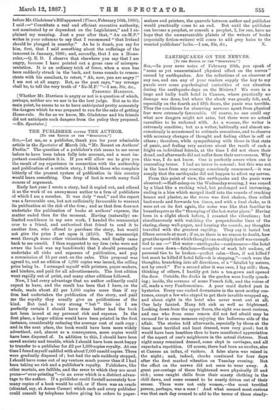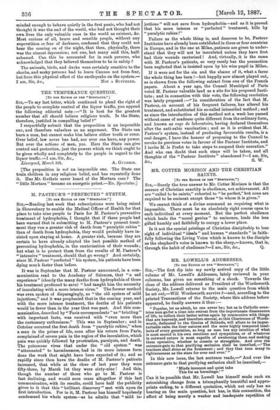EARTHQUAKES ON THE NERVES.
[TO TRII EDITOR 07 TER '• SPROTATOR."]
your news notes of February 26th, you speak of "some as yet unascertained physical effect on the nerves" caused by earthquakes. Are the reflections of an observer of any use, and can any of your readers supply the key to my puzzle over some psychological curiosities of our situation daring the earthquake-days on the Riviera ? We were in a large and badly built hotel in Cannes, whore practically no damage was done, but where the shock was greatly felt, and, especially on the fourth and fifth floors, the panic was terrible. Thus the conditions for observing nervous apart from physical fear were extremely favourable. Of course, no one could say what new dangers might not arise, but there were no actual casualties to be reckoned with. As a woman, the writer is extremely sensitive; but as a writer, habitually and almost un- consciously is accustomed to estimate sensations, and to observe with accuracy changes of thought and feeling either in self or others ; therefore, while sympathising with those in that state of panic, and feeling very anxious about the result of such a fright on individual friends, at the time I did not share their dread, and afterwards did not suffer from their nervousness. Why this was, I do not know. One is perfectly aware when one is concealing terror. I had no terror to conceal ; but this was not in the least from any courage consciously summoned,—it was simply that the earthquake did not happen to affect my nerves.
From this point of view, the earthquake and the panic were observed :—Half-asleep on the Wednesday evening, I was roused by a blast like a rushing wind, but prolonged and increasing, ending in a hiss which merged itself into the sounds of cracking beams and plaster, as the room was first shaken, then rolled backwards and forwards ten times, and with a final shake, as it were set on its feet again, the noise was like that familiar to housekeepers as the " thumping of the hot-water pipes." Having been in a slight shock before, I counted the vibrations; but simultaneously with watching the perpendicular lines of the staring, cheap wall-paper, and hearing the sounds, my thoughts travelled with the greatest rapidity. They say it lasted but fifteen seconds at moat; if so, as there is no reason to doubt, how great the speed with which thought can multiply itself was exempli- fied to me :—" Hot water—earthquake—continuance—the hotel must come down—fatalism—thoughts of work left undone, of personal ties to be broken—perfect calm—then, if not killed ? but must be killed if hotel falls—it is stopping,"—such were the thoughts, branching into all directions, of a " fatalist by nature, not by creed." For a second after it was over, I lay still ; then, thinking of others, I hastily got into a tea-gown and opened the door. Outside, the ducks in the garden were loudly quack- ing; inside, the screams of some French folk, and the voices of all, made a very Pandemonium. A poor maid darted past in hysterics. Every one rushed downstairs in the most motley cos- tumes, except a few who stayed to get their invalids wrapped up, and about eight in the hotel who never went out at all. One lady fainted. Many felt sick as well as frightened. Looking down from the upper floors, the sight was most curious, and one who from some reason did not feel afraid may be excused for in some measure enjoying the ludicrous side of the affair. The stories told afterwards, especially by those at the time most terrified and least dressed, were very good ; but it would have been heartless then to have manifested appreciation of the aspect of one's neighbours in the actual distress. Next night many remained dressed, some slept in carriages, and all expected a repetition. Of course, there had been an exodus, also at Cannes an influx, of visitors. A false alarm was raised in the night ; and, indeed, shocks continued for four days after the first marked vibration on Tuesday evening. Bat the effect on the nerves did not seem to wear away. A great per-tentage of those frightened were physically ill and sick ; some caught chills from their scanty clothing in the chill dawn, and some seemed to be nearly driven out of their senses. These were not only women, the most terrified person, perhaps, was a man 1 And what seemed most curious was that each day seemed to add to the terror of those steady- minded enough to behave quietly in the first panic, who hacinot thought it was the end of the world, who bad not thought their own lives the only valuable ones in the world as existent, &c. Most curious of all, brave and sensible people, without any superstition or fear of darkness, confessed that they could not bear the coming on of the night, that then, physically, there was the utmost depression; not one, but many said this, half- ashamed. Can this be accounted for in such persons, who acknowledged that they believed themselves to be in safety ?
The animals, birds, and ducks were certainly sensitive to the shocks, and airily persons had to leave Cannes not from fear, but from this physical effect of the earthquake on the system.—



































 Previous page
Previous page